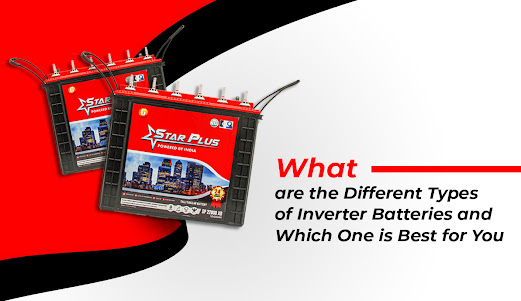A power inverter, or simply an inverter, converts direct current (DC) from batteries or solar cells to alternating current (AC). Inverters supply AC power to appliances that use this charge to function when there is no grid electricity. When used with a battery, it is known as a deep-cycle inverter.
In Nigeria, for the most part, inverters are used to power up appliances like light bulbs, air-conditioning units, and refrigerators or to maintain uninterrupted electrical power.
Having said that, different types of inverter batteries are suited to meet different requirements. For example, flat plate batteries, tubular batteries, etc., differ in quality and functionality.
Not every type of inverter battery is suited for every application. Below is a breakdown of the types of inverter batteries available and which one you should use.
If you are looking for the best tubular inverter battery, you can always rely on a Star Plus inverter battery for high longevity and supreme performance.
Types of Inverter Batteries
As mentioned, there are different types of inverter batteries, and each one serves a different purpose. The three most prevalent different types are Tubular Batteries, Flat Plate Batteries, and Gel or Maintenace Free Batteries.
Below is a short Star Plus battery review and general types of inverter batteries available.
Tubular Batteries
These, in effect, are lead acid batteries with Pb as the negative electrode and PbO2 as the positive one. It has Sulphuric acid as the electrolyte. Tubular batteries get their name from the positive tubular electrodes, which are, in essence, spines put under tube packets.
These batteries are heavy-duty, low in maintenance, and can be conveniently used in locations where there are frequent and long-duration power cuts.
They are pretty large, and thus you must always check the space you have in your home before you buy one. Also, they are available in different sizes and can be either short tubular or long tubular.
Short tubular, as the name suggests, are short in height and makes up for that in their width. And tall tubular batteries are taller in height and require a high ceiling space to be installed.
As stated, Tubular Batteries are generally low maintenance, meaning you need to refill the water as frequently as twice a year.
Flat Plate Batteries
These, too, are lead acid batteries, with the electrolyte being the acid. In most cases, Sulphuric acid is used as the electrolyte, and lead plates are used as electrodes. These are the cheapest among all the different types of inverter batteries; however, they are also the ones that last the shortest. Flat plate batteries can be conveniently used in areas where there is a steady supply of grid electricity.
Gel Batteries
Gel batteries are maintenance-free batteries that have silica added inside. They are of good quality, and as the name suggests, they require no maintenance whatsoever and can last up to 5 years or more. The fumes they dispose of are minimal compared to other types of inverter batteries and are non-toxic as well. For this reason, they can be easily installed in the interiors of your home. In comparison, other batteries need to be installed outdoors or at a safe distance from the dwellers of the home.
Why Tubular Batteries are the Best Choice?
From the above discussion, it might seem that gel batteries are the best choice for your home. They indeed have certain benefits over the other two types of batteries, but they are also quite expensive. They also do not last as long as tubular inverter batteries.
So, when all the pros and cons are gauged, a Star Plus inverter battery is the best choice for your home or commercial inverter. They are powerful, durable, and can be safely used in places with an insufficient supply of grid electricity.
Apart from that, tubular inverter batteries can charge and discharge at high temperatures and can easily power up heavy appliances.
.jpg)




No comments:
Post a Comment